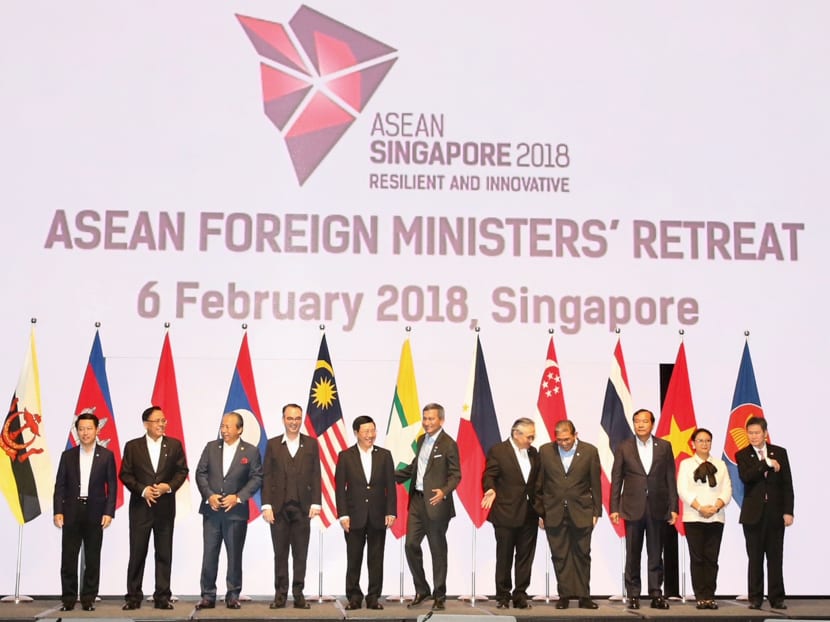Negotiation for South China Sea code expected to be complicated and sensitive: Vivian
SINGAPORE — Negotiations for the Code of Conduct (CoC) in the South China Sea will be complicated and the parties involved will ultimately need to exercise political will to resolve sensitive issues, said Foreign Minister Vivian Balakrishnan on Tuesday (Feb 06).

Asean Foreign Ministers, including Singapore's Vivian Balakrishnan (centre), have a group photo taken during the annual Asean Foreign Ministers’ Retreat in Singapore on February 6, 2018. The Retreat is the first gathering of Asean Foreign Ministers hosted by Singapore during its 2018 chairmanship of the grouping. Photo: Koh Mui Fong/TODAY
SINGAPORE — Negotiations for the Code of Conduct (CoC) in the South China Sea will be complicated and the parties involved will ultimately need to exercise political will to resolve sensitive issues, said Foreign Minister Vivian Balakrishnan on Tuesday (Feb 06).
Speaking to the media after he chaired the Association of South-east Asian Nations (Asean) Foreign Ministers’ Retreat, Dr Balakrishnan declined to give a specific timeline for when the actual negotiations will kick off. But he said they should start soon.
“I believe that the situation in South China Sea is calmer now, I believe there is a shared good faith and goodwill on both sides to try to advance… this year,” he said.
But he said the issue should be put into perspective. This is going to be a “very complicated negotiation, where territorial claims will not be resolved just because a CoC is in place", he added.
“There will be no shortage of very sensitive issues that will take a lot of innovation and imagination on the part of the diplomats and ultimately, an exercise of political will.”
When he was asked to confirm whether actual negotiations will kick off in early March in Vietnam, the minister replied: “All I would say is I think you’ve got good sources, but I don’t want to confirm or deny your suggestions.”
Last August, a framework for the CoC to manage disputes in the South China Sea was adopted by all 10 Asean member states and China.
In November, Prime Minister Lee Hsien Loong said at the Asean summit in the Philippines that CoC negotiations was expected to begin early this year.
Dr Balakrishnan added on Tuesday that the building up of trust between parties in order to engage in difficult negotiations is far more important than a timeline.
“So building up trust, getting the sequence right, doing it step by step is more important than doing it in a hasty way because of some artificial deadline.”
Earlier in the day, in a press statement issued by Dr Balakrishnan as chairman of the Asean Foreign Ministers’ Retreat, the grouping reaffirmed the importance of maintaining and promoting peace, security, stability, safety and freedom of navigation in and overflight above the South China Sea. The ministers also recognised the benefits of having the South China Sea as a sea of peace, stability and prosperity.
“We underscored the importance of the full and effective implementation of the 2002 Declaration on the Conduct of Parties in the South China Sea (DOC) in its entirety, warmly welcomed the improving cooperation between Asean and China and were encouraged by the conclusion and adoption of the framework of a CoC in the South China Sea, as well as the official commencement of the substantive negotiations towards the conclusion of an effective CoC on a mutually-agreed timeline,” he added.
“We reaffirmed the need to enhance mutual trust and confidence, exercise self-restraint in the conduct of activities and avoid actions that may further complicate the situation, and pursue peaceful resolution of disputes in accordance with international law, including the 1982 United Nations Convention on the Law of the Sea.”
The statement also noted that the ministers have supported Singapore’s proposal to create an Asean Smart Cities Network.
Dr Balakrishnan added in his statement that the ministers received a briefing from Myanmar on the humanitarian situation in Rakhine State, during which they expressed continued support for Myanmar’s humanitarian relief programme.
They urged Myanmar to continue to implement the recommendations of the final report of the Advisory Commission on Rakhine State, and welcomed the establishment of the Advisory Board for the recommendations on Rakhine State led in his individual capacity by former Thai Deputy Prime Minister and Minister for Foreign Affairs Surakiart Sathirathai, among other things.
Myanmar and Bangladesh signed an agreement last November for displaced persons sheltered in Bangladesh to return to Myanmar.
During the press conference, Dr Balakrishnan said the next step is for a “safe, dignified and voluntary repatriation of refugees”.
“In the meantime, Asean is fully committed to assisting the Myanmar government in its humanitarian response. But ultimately, what you need is a long term political solution,” he said.
“That’s the only way you can rebuild lives, communities, trust and then we can look forward to the future.”









